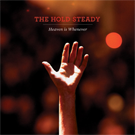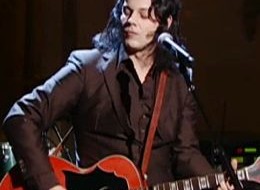
 Album name: Heaven is Whenever
Album name: Heaven is Whenever
Artist name: The Hold Steady
Genre: Rock
Released: 3 May 2010
Label: Vagrant/Rough Trade
ZME Rating: 9/10
Website: theholdsteady.net
A while back, I tweeted something to this effect: “If Craig Finn was a better singer, The Hold Steady would be a worse band.” In that respect, it would appear that Heaven is Whenever exists only to mock me. But more on that later.
Here, for the hither-to uninitiated, is a checklist of what every reviewer is obliged to say when discussing this album: 1) Franz Nicolay, moustachioed Keyboardist of Champions, has vacated the premises; 2) The Hold Steady can be easily, and quite lazily, described as America’s premier Springsteen-aping bar band; and then, 3) just shout the word “TRANSITIONAL” over and over and over until the next record comes along and either proves you victoriously right, or embarrassingly wrong, although, luckily, by that point everyone’s forgotten who actually said “transitional”, because all the reviews looked exactly the same anyway (with the honourable exception of the heroically perplexing NY Times review I mentioned previously) and anyway, you all just looked at the Metacritic averages. Audible sigh.
So with guitarist Tad Kubler more front and centre than he’s been since, perhaps, Almost Killed Me, the band’s oft-underrated debut album, The Hold Steady deliver us what they promise is a “less anthemic” record, with nods to more cinematic musical stylings. But since this is The Hold Steady we’re talking about, that basically just means that the anthemic choruses are present and correct, but there are slightly more bits that aren’t choruses. There might also be 40% less “whoa-whoas” than usual, but I’ve yet to do the proper maths on that.
The good news is that these “less anthemic” (those quotation marks are pretty important there) songs are bloody great. Opener “Sweet Part of the City”, an unusually restrained, nostalgia-tinged look back at a youth left behind, opens with some slide guitar straight out of buddy-band Drive-By Truckers’ playbook, and ends with Finn declaring that the band they started out of pure boredom “would like to play for you.” It’s the general mission statement of the album: “Okay, we’re here, we’re middle-aged, this is actually what we’re doing with our lives now, now here are some songs we want you to hear.”
Finn takes that slightly more mature viewpoint, and uses it to empathise with the kids he once identified with. He’s older, and if he’s not necessarily much wiser, he’s at least not getting any stupider. So on “Soft in the Centre”, he can offer fatherly advice that’s brain-smotheringly obvious, and make it seem like a startling moment of clarity: “You can’t get every girl, you’ll get the ones you love the best, you won’t get every girl, you’ll love the ones you get the best.” Or declare in “Our Whole Lives” that “We’re good guys, but we can’t be good every night.” It’s earned wisdom.
Now that he’s not dealing with Holly, Charlemagne and Gideon, he’s shifted from third-person narrator to first-person participant – which isn’t to say that there are no references to previous HS records. (I mean, it’s still Craig Finn we’re talking about. He could make the story of a working-class British kid’s rise to mediocrity in a low-paying office job in Sussex into a rock opera spread across three albums, and still work in thirteen unforgettable choruses.) But the Heaven is Whenever Finn doesn’t recount the tales of partying and youthful indiscretions with the same vigour and breathless enthusiasm he did on Separation Sunday.
In “The Weekenders” (an album highlight, featuring the psychic girl from “Chips Ahoy!” and “Two Crosses” – I think it’s safe to call her Jessie, but it’s hard to be entirely sure) he sings “You could say our paths have crossed before” with a world-wearied resignation: he’s grown up, but the scene is still as shambolic and immature as ever. And on “Hurricane J”, he’s breaking up with Jessie, and advising her to get away from that scene, because he knows that’s what best for her. There’s far less ironic distance between Finn and his characters now – where he seemed spiteful and disgusted on “One For The Cutters” from Stay Positive, here he alternates between sadly sympathetic and hopeful.
Luckily, his lyrics are as pinpoint sharp as ever. “The Weekenders” plays host to the incredibly pithy put-down, “The theme of this party is The Industrial Age… you came in dressed like a train wreck.” His talent for a memorable one liner is as evident as ever: “They didn’t name her for a saint – they named her for a storm”; “You’re damn right I believe in love, cos I’ve been in love and I’ve loved right back”; “And he tried to hand me a pamphlet about Hare Krishna/I said you’ve gotta be kidding… Who the hell is the blue guy?” (Working the question “Who the hell is the blue guy?” in a vaguely theological context into a rock record is about as brilliant as Craig Finn gets, I feel. Good work, that.)
And, going back to the first paragraph in some roughly circular, let’s-pretend-I-had-a-plan kind of way, he’s now singing those lyrics. There’s practically none of the street-corner poet spit-speak that Finn was so renowned for, and his rough sneer only appears briefly in the splendidly self-effacing “Rock Problems”. The band’s been heading in this direction for a while now – basically, growing away from being a less-esoteric Lifter Puller, and into being a less-esoteric Hold Steady – and this is the first album it feels completely natural on. “We Can Get Together”, a beautiful ballad about the unifying power of music (replete, of course, with references to Meatloaf, Husker Du, Heavenly and Utopia) is all the more affecting for being sung in his not-quite singing voice. The Franz-less band gives Finn more space to inhabit the songs, and just as imporantly, leaves more space when he holds back: “Barely Breathing”, with its clarinet solo, is busy enough without ostentatious keyboard fills, thankyouverymuch.
Speaking of busy songs, the Hold Steady are notorious for hugely epic closers, and “A Slight Discomfort” does not disappoint. Bobby Drake’s rolling drumbeat anchors a slightly-disjointed opening half that’s about as grim as The Hold Steady have ever dared to get (“Don’t it suck about the succubi? The bloodsuckers and the parasites. They’re never funny and they’re all so scared to die.”) before opening up into a grandly sweeping second half. The song, in what’s basically a complete reversal of the eternally brilliant and joyous “How A Resurrection Really Feels”, seems to be charting someone’s descent into something hopelessly dark – possibly addiction, possibly death, it’s never made explicit – and ends with the haunting sound of shallow breathing. It single-handedly justifies Kubler’s talk of being influenced by soundtracks and movie scores.
And that’s pretty much your lot. It’s terrific. Go get it. It’s terrific. Go get it. It’s terrific. Go get it. Did I mention that it’s terrific? Because, y’know. It is. Go get it.
Here Are Tracks, Listed:
- The Sweet Part of the City
- Soft in the Centre
- The Weekenders
- The Smidge
- Rock Problems
- We Can Get Together
- Hurricane J
- Barely Breathing
- Our Whole Lives
- A Slight Discomfort


